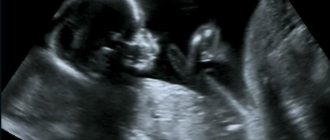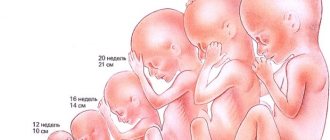The ninth month of pregnancy is the most emotionally intense period for every expectant mother, because after it the end of pregnancy and future motherhood are already visible on the horizon. It is not surprising that all the weeks of this month are full of thoughts and worries about the future birth and baby. A pregnant woman constantly looks at herself and listens to her own feelings: what if labor begins? Of course, the pregnancy, 33 weeks of which is already behind us, is about to end. However, a woman must live her ninth month treating her own body no less carefully than before.
Is sex possible at 9 months pregnant?
In the absence of any pathologies, sex in the ninth month of pregnancy, according to experts, is permitted.
Of course, you should refrain from sudden and energetic movements, but gentle and smooth sexual intercourse is welcome. Some girls fear that orgasm at 9 months will activate labor and labor will begin prematurely. There is a grain of truth in this. In the last weeks of pregnancy, contraction of the uterine walls during orgasm can promote labor. Therefore, for girls who have passed their due date (41-42 weeks), doctors recommend “close communication” with their spouse.
It should be noted that having sex and achieving the final result in it greatly trains the muscles of the uterus and prepares them for full labor. Therefore, if there are no pathologies or contraindications from the gynecologist, start “love training” from the second trimester.
During sex in the 9th month of pregnancy, the positions that are familiar to you are not always safe for the baby. Any pressure on the abdomen and deep penetration into a woman are strictly prohibited. During this period, the optimal poses may be “Picnic” (man from behind on his side) or “Cowgirl” (woman on top), where the girl independently feels and controls the depth of the man’s penetration.
During orgasm, blood flow in a woman's body and blood circulation in the placenta accelerate, which allows more oxygen to flow in. And this is very beneficial for the child’s well-being.
When the belly starts to grow
Now that you know what factors determine the size of the belly, let's figure out at what month of pregnancy it appears.
In the first trimester, you will not notice any changes in your abdominal circumference. The uterus still does not take up much space in the pelvis. Plus, she has not yet “grown” to the pubic symphysis and does not rise above it. This will only happen at the end of the 12th week.
In the second trimester, the fetus begins to grow rapidly. By the 16th week, the first changes are noticeable. At this stage, the belly is growing rapidly; if you look closely, the first changes will be visible.
But others will suspect an interesting situation only after 20 weeks. And only if you wear tight clothes.
By the beginning of the third trimester, it will be impossible to hide your pregnancy. The tummy will be visible even if you wear an oversized one.
What causes abdominal girth to increase?
First of all, the size of the uterus is affected by the growth of the fetus. It expands to provide him with comfort.
Affects abdominal girth and the amount of amniotic fluid. It changes unevenly. So at week 10 there are only 30 milliliters, and at 14-100 milliliters.
The volume of intrauterine fluid reaches its maximum by 37 weeks. It is 1.5 liters. By the end of pregnancy, the amount of water may become less - up to 800 milliliters.
Feelings at 9 months of pregnancy
The 9th month of pregnancy seems excruciatingly long and especially difficult for most women.
The mothers were both physically and emotionally tired, hoping to get through this period faster. The baby in the tummy is rapidly gaining weight, overgrown with subcutaneous fat, so the tummy seems unbearable and immense. Due to the fact that the fetus gradually moves “towards the exit”, dropping lower, breathing becomes easier. The shortness of breath has passed. But instead, the pressure on the lower abdomen increased, and spasmodic sensations appeared in the pubic area, inner thighs, and sometimes the tailbone.
The problem of insomnia in the ninth month of pregnancy continues for many women. And no matter how many expectant mothers count the sheep, thoughts about the upcoming birth still take over. Nervousness is associated with insomnia, some girls become hysterical, tearful - as they say, “hormones are running wild.”
Some doctors advise during this period to drink sedatives (valerian preparations) or treat yourself to tea with mint and lemon balm. Meditation and breathing exercises perfectly calm the nerves and put you in a positive mood.
Due to an increase in the amount of the hormone progesterone, which causes the uterus to contract, swelling in the last month of pregnancy only intensifies. This hormone retains fluid in the body, so by the 9th month the face, arms, legs, and fingers become somewhat plumper.
You can remove swelling in the last month by excluding salty, smoked, fried foods from your diet, active physical activity, and minimizing walks on a hot day. You should wear comfortable clothes, shoes, and use special medicinal ointments. It is recommended to take cool baths.
You can prevent the appearance of edema by consuming foods such as dried apricots, milk (preferably warm), and tea with lemon without sugar. If severe swelling is accompanied by pain in the kidney area, diarrhea, or elevated body temperature, you should immediately consult a gynecologist. After the baby is born, the swelling goes away.
Brief weekly review
How does fetal development proceed from 35 to 40 weeks, and what changes occur in a woman’s body?
Week 35 Our baby is growing by leaps and bounds - every week he gains 250-350 grams. With an average height of 46 cm, he already weighs 2.4 kg. Thanks to the accumulation of subcutaneous fat, the baby's skin becomes more and more straightened, but the cute folds on the legs, neck and arms will remain after childbirth. Unique fingerprints become clearer.
As before, a child needs a lot of calcium, because the formation of a person’s skeleton continues until the age of 25. If the nervous system and immunity have not yet completed their formation, and the lungs do not yet know how to breathe on their own, then in all other respects the baby is completely ready to appear to the amazed public.
Week 36. The baby is almost completely ready for birth. Most of its systems function fully (brain, liver, kidneys, circulatory system), others will be launched at the moment of birth: the lungs will begin to breathe, the intestines will remove processed food. It is precisely because the lungs do not yet perform their functions that the birth of a child during this period is considered undesirable, since he will need special equipment to breathe.
At week 37, the placenta begins to “age”, so the supply of nutrients decreases. The lungs are already sufficiently developed, but they are not yet included in the circulatory system. This will happen at birth, when a special valve opens in the newborn's heart. The baby inside already hears all the sounds and rejoices at the familiar voice of his parents, and in his brain the process of forming coordination of movements begins, which will last the first year of life. All reflexes become clearer, especially sucking.
At week 38, due to restrictions on nutrients supplied through the placenta, the baby’s growth and weight gain are inhibited. Although most mothers have a belly that is not just large, but huge, the baby is very cramped inside, so he is not so active. But during the day you should feel an average of 10 tremors. A special substance, surfactant, has already appeared in the tiny lungs, which will help you take your first breath. If you are expecting a girl, then she may well appear this week. Girls are bolder and prefer to finish a difficult task quickly.
Baby's size and final weeks
If it is difficult for you to imagine what your baby looks like from a photo of the fetus, then at 39 weeks in weight and length it resembles a small watermelon of 3 kg with a diameter of 50 cm. Among the features of this week, it is worth mentioning the inability of the child to focus his gaze further than 30 cm - this is exactly the distance he needs to see his mother's breasts and face. But his brain already perceives volume, colors and movement.
In appearance, the child is no different from a newborn, but his motor activity decreases even more - there is no space left in the uterus, the amount of amniotic fluid has decreased, and in order to be born, he needs to accumulate more strength.
If you have been walking for 40 weeks, then your baby is clearly in no hurry, despite the fact that he is completely ready to get acquainted with the new world. Only the bones of the skull were not fused to make it easier to pass through the birth canal. Fusion will occur within a few days after appearing on the account.
Belly in the ninth month of pregnancy
In the ninth month of pregnancy, the belly does not grow so rapidly. And although the child’s weight increases, the volume of the belly remains the same. It often happens that in the last month of pregnancy the lower abdomen hurts. This is due to the advancement of the fetus into the pelvic area. The mass of the child puts pressure on the pelvic and pubic bones, pressing down on the nerve endings, which explains the nagging pain in the lower abdomen and spasms in the pubic area.
Even visually, you can notice that the recently rounded, raised tummy has become pear-shaped and has dropped slightly.
As a rule, in first-time mothers, abdominal prolapse is observed two or more weeks before the birth of the child; in case of repeated births, it occurs directly during the birth process. What else can problems with a “pregnant” tummy indicate:
- The stomach becomes stone at 9 months or hardens - this indicates that the uterus at this time is in good shape, that is, it is ready to “push out the baby.” Labor can begin at any moment;
- your stomach itches terribly: as people say, it means you’ll give birth soon. And it is true. In the third trimester, the volume of the belly rapidly increases, and the skin becomes taut like a bowstring. That's why it itches and even peels off. It is recommended to use creams or natural vegetable oils to moisturize the skin;
- if your stomach is twisting, bloating appears accompanied by heartburn, it is strongly recommended to adjust your diet: give up carbonated water, foods with high acidity, eat often and in small portions;
- nagging pain in the lower abdomen, accompanied by contractions at a certain interval (about 10-15 minutes) indicate the onset of labor. You need to call an ambulance or go to the maternity hospital yourself.
If any pain in the abdomen bothers you and worries you, do not hesitate to consult a doctor. The life and health of the child, first of all, depends on you, mommy.
Reviews from women about the 9th month of pregnancy
For the entire ninth month I was in conservancy. There is little pleasant: IV, injections, pills, suppositories. I was so confused by them that I even made a schedule on a piece of paper and put crosses when I drank something. Apart from saving, there is nothing to remember. And here. My baby started kicking very hard. Very!!!! He was already feeling cramped and his stomach was lumpy. It was possible to understand where which part of the body was located. In addition, an ultrasound was performed at 35 weeks. It turned out that the baby’s weight is 3600. And polyhydramnios. And everything is OK. They also did a Doppler ultrasound. This ultrasound, only a special one, examines the blood vessels of the fetus and placenta. How well the baby is supplied with oxygen and nutrients. Everything was fine. Only placenta of 3rd degree of maturity is the last degree. Kinda old already. There are also 3 loops of the umbilical cord at the neck. Creepy. All the problems started at the end of this month. A sharp weight gain began. Before giving birth this month I gained about 8 kg!!!!! Horrified. And the swelling began. Not strong, but not very pleasant. Even at night, pain began in the lumbar region and the uterus contracted. I was afraid that labor would not begin. The belly was very big, as if she was expecting twins
Sea Star
https://www.pervenez.ru/forum/devyatij-mesyatc-beremennosti-t417.html
I want to share my experience regarding having sex during pregnancy - it was sex at the 41st week that contributed to the onset of labor (despite the bend of the uterus - the cervix immediately dilated by 10 cm). It is clear that I carried the pregnancy to term, and when the nurse from the clinic constantly called on the phone and insisted on going to the maternity hospital for stimulation, I did not react to this. My doctor said that everything was fine with the child and I took it calmly - everything will begin when the time comes (especially since my husband’s mother-in-law was also nursing, and my baby, like dad, was well-fed and was also in no hurry to be born). Throughout the pregnancy we had sex regularly (excitement and orgasms were constantly present). But when the uterus was in good shape—naturally, no sex or excitement—the instinct of “maternal” self-preservation immediately awakens.
Victoria
https://www.komarovskiy.net/forum/viewtopic.php?t=1765&start=15
A day before my water broke, I had false contractions at night. I woke up thinking that my period had started. The sensations are exactly the same, aching pain... Then I realized that what are the periods in the 9th month???? I think that's all - childbirth!!! I got up, walked around, and decided that I would go to bed again, if they were repeated periodically, then I would have to wake up my husband and get ready for the maternity hospital... And I fell asleep. And I was getting ready to go to the maternity hospital exactly the next night.
Maria
https://www.pervenez.ru/forum/devyatij-mesyatc-beremennosti-t417s15.html-sid=be97289c539f4b15b65a01a94f9d4160
Miscarriage in the ninth month of pregnancy
Fetal freezing in the last trimester occurs infrequently.
Often, a miscarriage in the 9th month of pregnancy occurs due to the presence of a blood clot in the umbilical cord, formed due to thick blood and its poor clotting. The child dies due to lack of oxygen. Because of this, in the eighth to ninth months of pregnancy it is necessary to listen especially sensitively to the movements of the baby. If they are infrequent or, conversely, too active, this indicates a lack of oxygen. You should immediately report any suspicions to your doctor. Various inflammatory processes or an infection not detected in time can lead to the death of the baby. Miscarriage in the ninth month of pregnancy can be caused by various genetic diseases. Therefore, during the pregnancy stage, pregnant women so often undergo all kinds of tests.
The main factors causing the risk of miscarriage:
- Smoking, uncontrolled drinking of alcohol, immoral lifestyle;
- Infectious diseases;
- Depression, stress;
- Injuries, falls, excessive physical activity;
- Rhesus conflict among spouses (the woman is Rhesus negative, the man is Rhesus positive).
Severe abdominal pain accompanied by bleeding indicates a serious problem. You should immediately seek help from a doctor.
Nutrition during the 9th month of pregnancy: keeping an eye on your figure
Nutrition in the ninth month of pregnancy must be healthy and balanced.
The menu is carefully selected and scheduled by the hour. During pregnancy, many girls indulged themselves with fresh buns, grandmother’s delicious pies, and could not refuse the “last” chocolate. As a result, extra grams and a disapproving look from the gynecologist.
To ensure proper nutrition in the last month of pregnancy, you should include the following dishes and products in your diet:
- dairy products (kefir, yogurt, cottage cheese);
- lean meat (beef, turkey, rabbit), steamed or baked in the oven;
- vegetables and fruits rich in fiber (it is advisable to eat fruits in the first half of the day);
- all kinds of cereals;
- Avoid soda and drink fresh dried fruit compotes.
Doctors recommend organizing a fasting day once a week: eating apples or drinking kefir.
Do you need multivitamins in the last months of pregnancy?
A very frequently asked question on forums for expectant mothers: are multivitamins needed in the last months of pregnancy, and which vitamins are preferable to take?
Multivitamins are preparations containing several vitamins and minerals in one dose (tablet). It is advisable to take such a “complex vitamin” in early pregnancy, where the lack of folic acid, vitamin E, and calcium is especially noticeable and is required for the full formation and development of the fetus. The prescription of a vitamin and mineral course in the 9th month of pregnancy is primarily due to:
- health of the mother in labor (weakened body, cold);
- with pathologies in fetal development;
- unbalanced nutrition of a woman.
Some women refuse to take multivitamins in the last trimester, citing their reluctance to “clog” the body with chemicals and fear of developing a large fetus.
The best multivitamin, according to pregnant women, is a balanced diet. If the brain has forgotten about taking a vitamin, and the hand does not reach for the jar out of habit, it means that the body itself is talking about an oversaturation of “benefits” and the need to take a break.
Nausea at 9 months pregnant
Nausea, malaise, vomiting in the last month of pregnancy are harbingers of late toxicosis, gestosis.
Often, toxicosis in the 9th month of pregnancy occurs in women over 35 years of age or in very young mothers. Vomiting in the last month of pregnancy may simply be due to banal overeating. The enlarged uterus leaves little room for the stomach to “feast”, so a huge amount of food simply cannot fit.
Some women, immediately before the birth process itself, experience problems with the intestinal tract and stomach: vomiting begins. This suggests that the body, as it were, gets rid of excess burden, cleanses itself so that the birth process occurs more easily.
Pregnant woman registered at the antenatal clinic
In the last month, it is quite logical to expect childbirth, so visits to the antenatal clinic should become more frequent - most likely, you will be asked to see each week. At each appointment, the expectant mother will be asked questions about her well-being, her blood pressure, abdominal circumference and uterine fundus height will be measured, and her weight will be recorded. Several important tests need to be taken:
- blood test to determine platelet and hemoglobin levels. These indicators are very important, since during labor there is a high risk of blood loss, and it is important to make sure that the body is ready for this;
- analysis for protein in urine - detection of such inclusions may be a sign of late toxicosis. Normally, there should be no protein in the results at all;
- vaginal smear for flora. Before giving birth, it is important to make sure that there is no infection in the birth canal. During the inflammatory process, tissues do not stretch well, tear easily and heal slowly, which can lead to unpleasant complications during and after the birth of the baby. If changes are detected in the smear, the doctor will prescribe preventive treatment.
Table: main indicators of a blood test in a pregnant woman in the 9th month
| Index | Normal value |
| Hemoglobin | 119–140 g/l |
| Red blood cells | 3.5*1012 – 5.65*1012 cells/l |
| Platelets | 140*109 – 400*109 cells/l |
| Leukocytes | up to 15*109 cells/l |
| Lymphocytes | 18–44% |
| ESR (erythrocyte sedimentation rate) | up to 45 mm/h |
During the examination, the doctor must assess the condition of the fetus by performing a CTG - cardiotocogram or at least listening to the abdomen with an obstetric stethoscope. In some cases, ultrasound and Dopplerometry (study of placenta-fetus blood flow) are additionally prescribed.
To assess the condition of the fetus, CTG results are used, which give an idea of the work of the child’s heart muscle.
A pregnant woman should leave the doctor’s office in the 9th month with comprehensive information about her condition:
- the degree of readiness of the uterus for childbirth according to the results of the examination;
- the state of the baby’s cardiac activity;
- the presence or absence of abnormalities according to the results of tests and ultrasound.
Discharge at 9 months
Female discharge is a common natural phenomenon.
Through secretions, the body cleanses and moisturizes the vagina. Discharge in the last month of pregnancy is considered normal if it is light, transparent and without a sour odor. Gray, cloudy leucorrhoea signals vaginal infections. Curdled white discharge in the 9th month of pregnancy is an indicator of thrush, which must be gotten rid of. If there is a discharge with a little mucus and some blood, this is a signal of the release of the mucus plug, which protects the membranes of the fruit. This means that you will soon become a mother. A bad sign is bloody discharge or bleeding in the last month. You should immediately seek medical help because there is a risk of premature birth or miscarriage.
Medical examinations
The 9th month is the most difficult period of time. After all, it is already difficult for the expectant mother to walk, and she will have to visit the doctor more than once this month.
The doctor will measure blood pressure and refer the woman for various tests, including studies of the child’s vital signs - ultrasound, CTG.
In addition, the gynecologist will take vaginal discharge for analysis. This is necessary to make sure that there is no pathogenic flora that can be transmitted to the baby during the birth canal.
Other studies are also carried out, the decision to conduct them is made by the doctor based on other indications.
Child development at 9 months of pregnancy
In the ninth month of pregnancy, the child assumed a comfortable position. As a rule, the head is downward (cephalic presentation). If the baby is sitting on his bottom (breech) or has taken a longitudinal/oblique position, the obstetrician recommends a caesarean section. The child is already quite small in size, he is strong and strong. Weight gain in the last month of pregnancy is from one to two kilograms. So, if at the 8th month the weight of the fetus was 2-3 kg, then at the 9th month - 3-4 kg. Length varies from 45 to 53 cm.
All the vital organs and systems of the baby are formed and functioning, so in the event of premature birth, the child has every chance of full-fledged life activities.
The baby's energy has decreased somewhat. The small size of the uterus does not provide the opportunity to fully roam. But if at 9 months of pregnancy the baby is very active, you should tell your doctor. Such dynamics are typical during oxygen starvation.
In the last month of pregnancy, the baby tends to:
- The child’s skin takes on a pink tint, and folds form due to subcutaneous fat;
- Thanks to the formation of the immune system, the baby can resist various viruses;
- The child reacts to the mother’s voice and touch, and may respond by “buzzing.” More often, of course, the baby sleeps, but you can feel 10 kicks in 12 hours.
Like the mother, the baby is looking forward to meeting and getting to know the world, so at the beginning of the 9th month he is gradually moving towards the “exit”.











